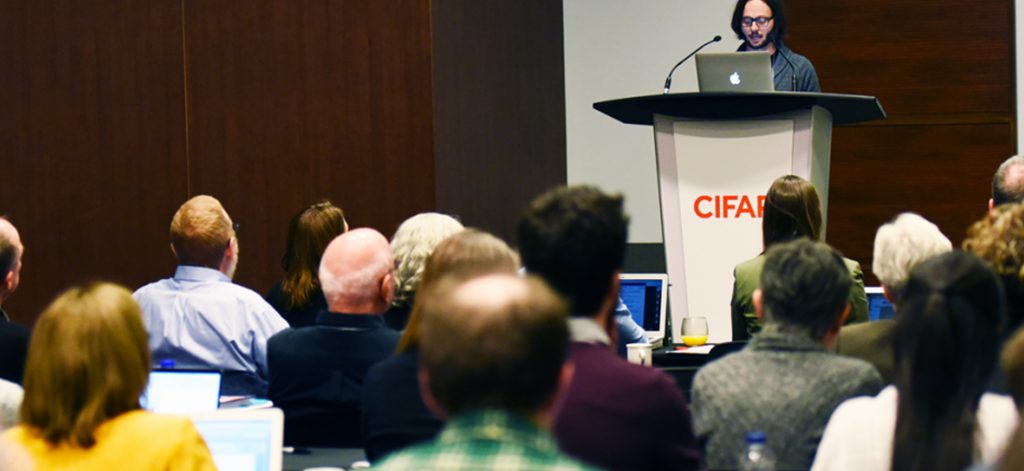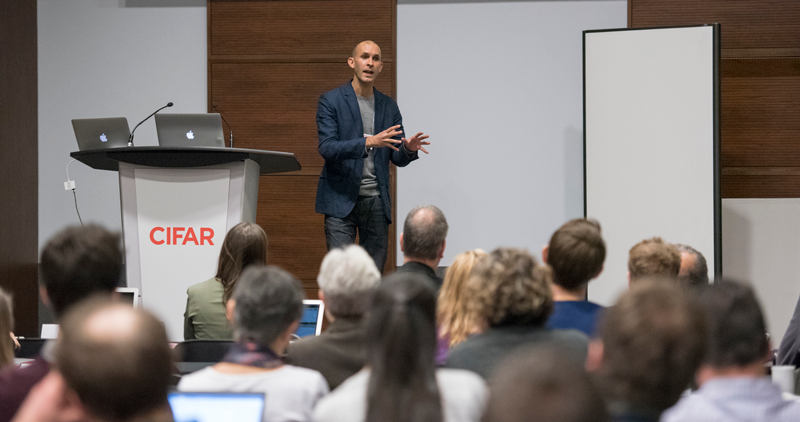By: Cynthia Macdonald
11 Apr, 2018

About 40 researchers from the disciplines of neuroscience, computer science, biology, genetics, psychology, quantum physics, medicine, biochemistry and philosophy attended the March 12-13 conference.
The symposium enabled fellows in CIFAR programs to identify synergies and new frontiers of research and collaboration. “We brought together an amazingly diverse group of scientists to start a dialogue on ways to better understand the brain and brain function,” said Sheena Josselyn (Hospital for Sick Children), a neuroscientist and CIFAR Senior Fellow (Azrieli Program in Brain, Mind & Consciousness) who co-planned the symposium’s program with Blake Richards (Learning in Machines & Brains), Takao Hensch (Child & Brain Development), and B. Brett Finlay (Humans & the Microbiome). “The thought-provoking talks spurred some intense discussions and friendly disagreements — I think we all learned an enormous amount from each other.”
At the event, scientists studying how adversity affects development, as well the nature of consciousness, traded insights with those working in the field of artificial intelligence and deep learning. Indeed, the symposium revealed the many ways in which biological and machine study inform and complement each other.
“It is often difficult to get such a diverse group of outstanding scientists together. However, this unique CIFAR symposium showed it can be done, and done in a fun and open environment.”
Researchers in all brain-related fields share many common goals, such as how best to take advantage of the latest data capture and brain imaging tools. Other concerns that emerged included: the microbiome’s role in human brain health; the latest findings concerning neuro-developmental and neuro-degenerative conditions, such as autism and Alzheimer’s disease; advances in vision and language research; and the effects of individual differences in brain development.
 Azrieli Program in Brain, Mind & Cinciousness Senior Fellow, Anil Seth (photo credit: John Narvali)
Azrieli Program in Brain, Mind & Cinciousness Senior Fellow, Anil Seth (photo credit: John Narvali)
Speakers presented a series of flash talks on their recent findings, moderated by CIFAR Senior Director Research & Global Academy, Pamela Kanellis. In subsequent breakout discussions attendees were encouraged to identify areas of mutual interest in order to spark provocative new research questions.
At the end of the symposium, CIFAR Vice-President, Research John Hepburn invited potential collaborators to submit proposals for new interdisciplinary collaborations across CIFAR’s research portfolio that would be supported by CIFAR Catalyst Funds.
The event “challenged each scientist to think outside their comfort zone. In so doing, it spurred some unique collaborations,” said Josselyn. “It is often difficult to get such a diverse group of outstanding scientists together. However, this unique CIFAR symposium showed it can be done, and done in a fun and open environment.”